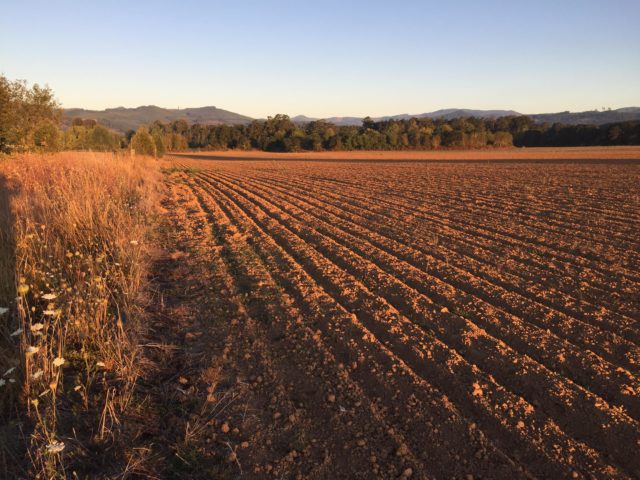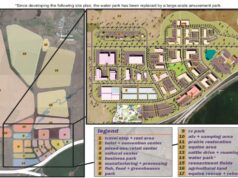

Janie Simms Hipp, a Chickasaw woman from Idabel, was tapped earlier this year to become chief law officer for the U.S. Department of Agriculture, and the U.S. Senate confirmed her appointment on July 30.
She is the first Indigenous woman to oversee agriculture law in the United States. This means the ways the government obtains and produces food, deals with climate change and preserves natural resources will now be influenced by someone who combines an expansive résumé in the agriculture sector with the traditional ecological knowledge of her tribe.
Hipp has more than three decades of legal experience, mostly in agriculture law. Sen. Debbie Stabenow, (D-MI) who introduced Hipp at her confirmation hearing, said Hipp was the first nomination in 20 years with such an expansive background in the field.
“Ms. Hipp has dedicated her career to promoting the important role of women and First Americans in advancing food security, sustainable agriculture, and equitable agriculture policy,” Gov. Bill Anoatubby of the Chickasaw Nation said in a statement. “Her keen understanding of the agricultural community, experience, legal skills and commitment to fairness make her uniquely suited for this important role.”
Hipp: ‘I grew up listening to farmers’ stories’

Hipp said throughout her career she’s often been the only woman in the room, or the only lawyer in the room, or the only Indigenous lawyer in the room. That didn’t bother her.
“I just kept doing my work and kept marching forward,” she said.
In her confirmation hearing, Hipp explained the reason she sees her job through the eyes of a farmer is that she was raised by one. Growing up in Idabel, an agriculture and forest-dependent town of around 5,000 people, at the time, her parents were educators who took higher education very seriously.
“Higher education was never an option in our house, it was expected,” Hipp said in the hearing.
Hipp graduated from the University of Oklahoma before attending Oklahoma City University at night while working during the day, and eventually obtaining an agriculture and food law degree from the University of Arkansas.
Hipp’s father owned a tractor dealership that went under during the farm credit crisis of the 1980s. Hipp said in her confirmation hearing that, through her father’s business, she and her sister learned the ropes of the agriculture business from an early age.
“I did the payroll every Saturday and my sister and I helped with the books every month,” Hipp said in the hearing. “I grew up listening to farmers’ stories as they came by for coffee.”
Hipp joints a handful of other tribal citizens appointed by the Biden administration, including Interior Secretary Deb Haaland. Charles F. Sams III, a member of the Confederated Tribes of Umatilla, was nominated to oversee National Park Services. Robert Anderson, who belongs to the Bois Forte Band of the Minnesota Chippewa, was nominated as the solicitor of the Department of the Interior. Jaime A. Pinkham, a citizen of Idaho’s Nez Perce tribe, was appointed principal deputy assistant secretary of the Army for civil works.
“I know (Hipp), glad to have her here in D.C.,” Pinkham said. “And Chuck Sams and I have spent countless miles traveling the Northwest together, so I was really tickled to see him being nominated.”
Indigenous people in agriculture
Native Americans account for more than 79,000 of the country’s 3.4 million agricultural producers, with the majority being in the Plains and western states.
In 2017, Oklahoma was second in the nation for number of Native producers, with 17,102 farmers. Oklahoma tribal citizens represent 13 percent of Oklahoma producers, according to the 2017 Census of Agriculture, a study done every five years which provides a complete count of U.S. farms and ranches and the people operating them. It examines income and expenditures, land use and ownership, operator characteristics and production practices.
Hipp said uplifting the capabilities of all communities’ agriculture is important and she thinks making Indigenous agriculture visible makes a huge difference.
Mike Weeks, former president of the Oklahoma Cattlemen’s Association and owner of Stuart Farm and Ranch Supply in Stuart, Oklahoma, lives to the east of the Chickasaw Nation between the Choctaw and Muscogee nations’ boundaries. He said he sees firsthand the expansion of agriculture participation in Oklahoma tribes.
The Muscogee Nation, for example, opened a meat processing plant, something Weeks said should bolster an industry hit hard by the pandemic. The Muscogee and Choctaw nations have fairly sizable cattle operations, Weeks said.
“It’s really good for the area and the economy and just Oklahoma in general that these tribal nations are really stepping up and taking a very active role in agriculture,” Weeks said. “I think that just continues to help them and our state as well.”
Weeks said he thinks the appointment of Hipp as USDA general counsel is a huge opportunity for not only tribal nations but for her home state of Oklahoma, where agriculture and energy are the two top economic drivers.
Bringing Indigenous knowledge to the USDA
The USDA is home to 29 agencies with responsibilities for natural resource conservation and preservation, forestry, support for farmers and ranchers, rural development and more.
“It is a huge honor to be the general counsel, because it brings together all of my over three decades of work, but it also brings together who I am,” Hipp said, citing her own background in tribal ecological knowledge.
She said this information is usually passed down orally through storytelling in various Indigenous cultures. Each tribe has its own wealth of ecological knowledge.
Hipp said the USDA’s Natural Resource Conservation Service has for years recognized the ecological knowledge of tribes. She points to its use in the Forest Service and prioritizing Indigenous voices in resource conservation in Wisconsin as examples.
With its breadth of influence and oversight across a wide scope of agriculture, food security and resource conservation, the USDA is a great place to be, Hipp said. She said she’s excited for the changes she can instill into the agriculture realm and Indian Country at large.
“I will always keep our nation’s farmers and ranchers — no matter who they are — as my guiding light and north star,” Hipp said.





















